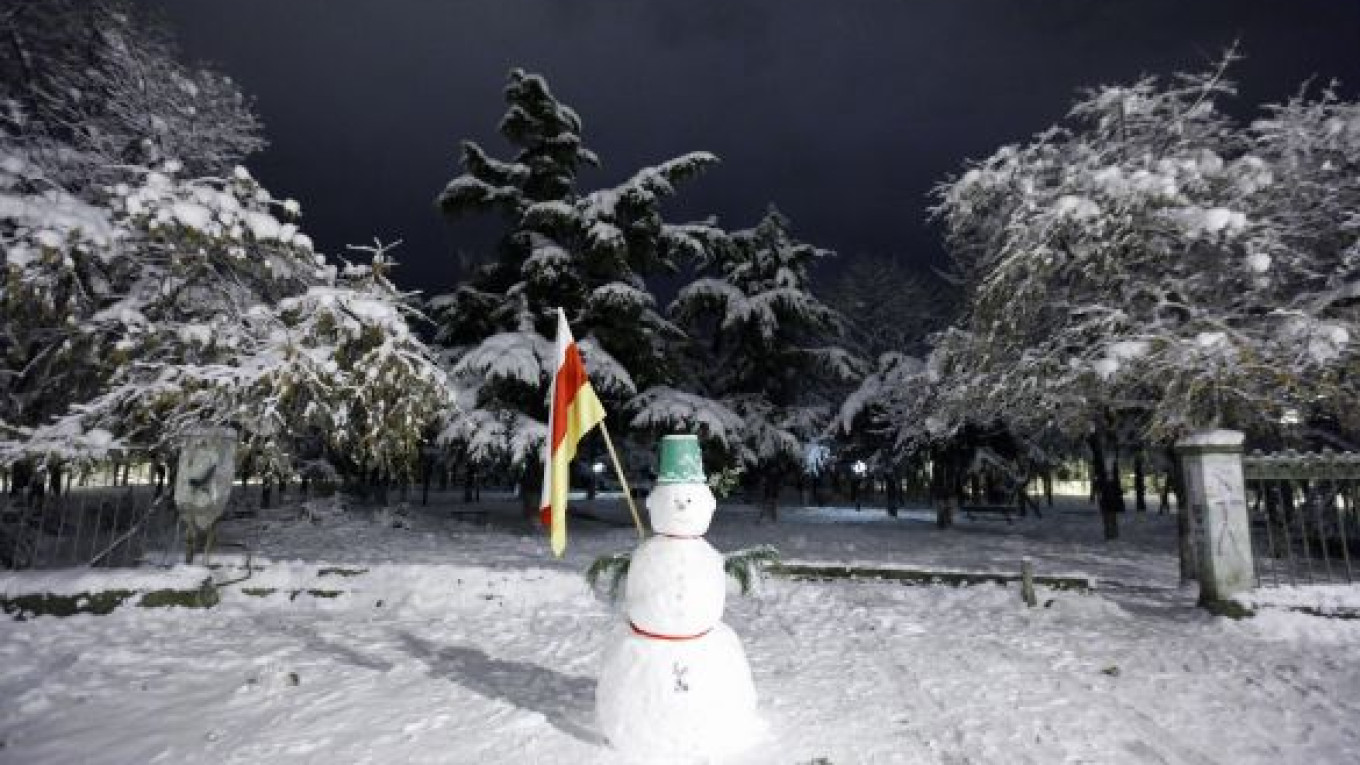TSKHINVALI, Georgia — South Ossetia does not need a new presidential election, the candidate whose apparent victory over a Kremlin-backed rival was annulled in the breakaway Georgian province said Thursday.
As anti-corruption crusader Alla Dzhioyeva spoke, armed troops surrounded the government building in the separatist capital of Tskhinvali, gearing up for a rally of her supporters.
Dzhioyeva declared herself president after she led with about 57 percent of Sunday's runoff vote with ballots from 74 of the 85 precincts counted, while rival Anatoly Bibilov trailed with 40 percent.
But the separatist government annulled the vote due to alleged violations and barred Dzhioyeva from participating in the new vote.
"I won my election, 17,000 out of 30,000 [voters] cast their ballots for me," the 62-year-old former school principal told journalists. "This is our victory, and they want to steal it."
She said thousands of supporters would rally later in the day in front of the government building as South Ossetia's Supreme Court deliberates her appeal on the annulment and whether she is allowed to run in the March revote.
Dzhioyeva also demanded that the court reach its decision by Thursday evening, saying otherwise outgoing President Eduard Kokoity's government "will be responsible for further developments."
Fearing a large protest, trucks and armored military vehicles cordoned off the government building in the capital, Tskhinvali, and dozens of armed military officers, some of them masked, surrounded the area.
Addressing Dzhioyeva's supporters, who gathered at a nearby square, former Defense Minister Anatoly Barankevich urged them to refrain from violence. "They are just waiting for an excuse to declare an emergency situation," the widely respected veteran said.
South Ossetia broke away from Georgia in a war in the early 1990s after Georgia abolished the province's Soviet-era administrative and linguistic autonomy. Spiraling tensions between pro-Russian separatists and the Western-leaning Georgian government triggered a brief war between Russia and Georgia in 2008.
Since then, Russia recognized South Ossetia as an independent nation — and South Ossetians hoped that Russian aid and backing would improve their living conditions.
But only a few other nations around the world followed Moscow's suit, while a Georgian economic blockade and misappropriation of lavish Russian funds triggered inflation and left many unemployed.
Dzhioyeva and Bibilov won about 25 percent of the vote in the first round of the election in mid-November. Both supported close ties with Moscow, but Dzhioyeva also pledged to make the distribution of Russian aid transparent and rebuild houses and infrastructure destroyed by years of neglect and fighting.
Bibilov was the choice of the outgoing leader, Kokoity, whom critics have accused of embezzling Russian aid.
A Message from The Moscow Times:
Dear readers,
We are facing unprecedented challenges. Russia's Prosecutor General's Office has designated The Moscow Times as an "undesirable" organization, criminalizing our work and putting our staff at risk of prosecution. This follows our earlier unjust labeling as a "foreign agent."
These actions are direct attempts to silence independent journalism in Russia. The authorities claim our work "discredits the decisions of the Russian leadership." We see things differently: we strive to provide accurate, unbiased reporting on Russia.
We, the journalists of The Moscow Times, refuse to be silenced. But to continue our work, we need your help.
Your support, no matter how small, makes a world of difference. If you can, please support us monthly starting from just $2. It's quick to set up, and every contribution makes a significant impact.
By supporting The Moscow Times, you're defending open, independent journalism in the face of repression. Thank you for standing with us.
Remind me later.


